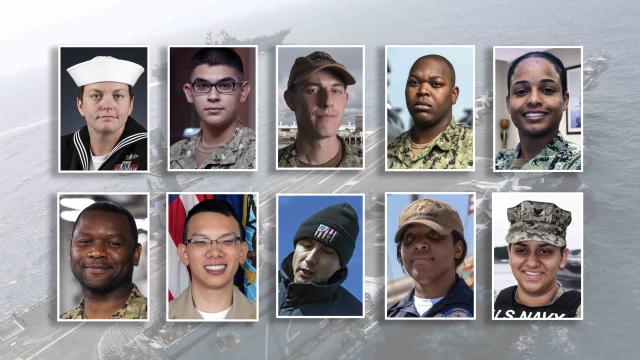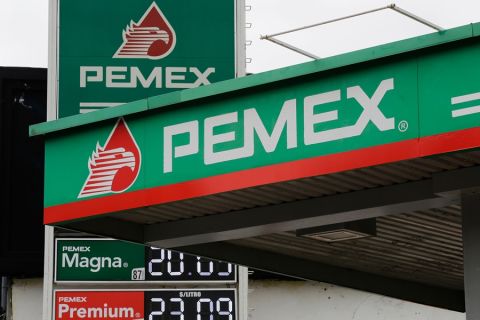
Just a handful of citizens from Houston, the world’s energy capital, serving with the U.S. Navy around the world. Top row: Electronics Technician 1st Class Jennifer Good; Petty Officer 2nd Class Aaron Miller; Petty Officer 1st Class Michael Ervin; Petty Officer 3rd Class Darrin Gipson; Lt. Vanessa Brown. Bottom row: Petty Officer 1st Class Lonnie Stafford Paul Jr.; Ensign Samuel Quach; Fire Controlman 1st Class Alexander Perez; Petty Officer 1st Class Chasity Eastland; Petty Officer 3rd Class Betsy Amaya Rodriguez. Background: recent photo of the aircraft carrier USS Abraham Lincoln in the Arabian Sea, with amphibious assault ship USS Kearsarge. (Source: U.S. Navy)
Editor's note: Opinions expressed by the author are his own.
Somewhere in the Arabian Sea—perhaps the Persian Gulf when you read this—5,700 Americans serving their country are ensuring that oil continues to flow and the world does not come any more unglued than it already is.
They are in that region, aboard the 97,000-ton aircraft carrier USS Abraham Lincoln, because Iran has threatened to cut off the flow of oil through the Strait of Hormuz. The presence of “Big Abe” in the region has paid off: the U.S. Defense Department has reported that the Iranians elected to remove missiles from small boats stationed in their waters. Just a few months ago, some of those boats actually fired missiles in the presence of a U.S. aircraft carrier, albeit in the opposite direction.
As a member of the news media, I regularly receive emails from the U.S. Navy telling me about Houston natives serving around the world. I always read them, even though I’ve wondered why the Navy Office of Community Outreach list included an editor writing for a trade website.
Then it occurred to me, smack dab between Armed Forces Day and Memorial Day, that while these patriotic young folks are protecting all of us, they are very often specifically protecting the industry I write about.
Argue about the Iran nuclear deal, but take away a U.S. commitment to protect tankers and the Persian Gulf becomes an Iranian lake, with vessels subject to the kinds of sabotage that was inflicted just in the last couple of weeks.
Some 3,400 miles to the west, another U.S. Navy vessel, the guided missile destroyer USS Preble sailed into the South China Sea in mid-May for no other reason than to inform the Chinese government via its presence that it could. Not entering that area would validate China’s claim on the entire sea, which essentially would put any waterway, anywhere, at risk of closure.
Yes, the enormous success of U.S. shale plays has granted this country not just a high level of energy security, but the ability to export that wealth and share that energy security with allies and trading partners. Not without secure sea lanes, though.
The growth of the U.S. oil and gas industry is predicated on a single aspect: exports. Without the ability to ship the product, either by pipeline or by tanker, the domestic industry doesn’t grow. Without the ability to move oil and LNG on the seas anywhere in the world, the global economy grinds to a halt.
Look at the images atop this story. Those are the people—some smiling, some looking tough, almost all clearly uncomfortable in front of a camera—who keep our country and our world safe, and this industry prosperous. On Memorial Day, we remember those who served and sacrificed for our freedom. Keep those who serve their country now in your thoughts, as well.
Joseph Markman can be reached at jmarkman@hartenergy.com. Twitter handle: @JHMarkman.
Recommended Reading
US Orders Most Companies to Wind Down Operations in Venezuela by May
2024-04-17 - The U.S. Office of Foreign Assets Control issued a new license related to Venezuela that gives companies until the end of May to wind down operations following a lack of progress on national elections.
EU Expected to Sue Germany Over Gas Tariff, Sources Say
2024-04-17 - The German tariff is a legacy of the European energy crisis that peaked in 2022 after Moscow slashed gas flows to Europe and an undersea explosion shut down the Nord Stream pipeline.
Pemex to Remain Fiscally Challenged for Mexico’s Next President
2024-04-16 - S&P Global Ratings said Pemex will remain a fiscal challenge for the country’s next president, adding that continued cautious macroeconomic management was key in its ratings on both Mexico and Pemex.
Yellen Expects Further Sanctions on Iran, Oil Exports Possible Target
2024-04-16 - U.S. Treasury Secretary Janet Yellen intends to hit Iran with new sanctions in coming days due to its unprecedented attack on Israel.



